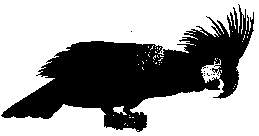 in aviculture since 1973 |
|
|
|
Sorry, we no longer breed birds.
 in aviculture since 1973 |
|
|
|
|
|
 |
|
Our
philosophy regarding diet is to feed as natural a diet as is
possible in captivity. In the wild, exotic birds have access
to a large variety of nutritious fresh foods that vary as to
season. We cannot duplicate the diets that various species would
eat in the wild but feeding a large variety of fresh vegetables,
fruits, and grains comes the closest to this. We are often asked
if we recommend either a seed diet or a pelleted diet and the
answer to that is neither. Instead our diet is based on sprouted
grains and seeds and raw and cooked vegetables with some fruits
also. We
sprout a large variety of grains and seeds on a daily basis.
We use the sprouting kits sold by China Prairie Company as a basis
for our sprouting regimen. Two types of kits are available, AFD-Psittacine
and AFD-Micrograin. We use the AFD-Micrograin and add additional
grains to the mixture. AFD-Micrograin is comprised of triticale,
rice, millet, alfalfa, fenugreek, buckwheat, fennel, flax seed,
dill seed, sesame seed, amaranth, quinoa, mung bean, radish seed,
and red clover seed. We add hulled sunflower seed, corn, garbanzo
beans, red peas, lima beans, white beans, red wheat, lentils,
and other varieties of pulses to this sprouting mixture for larger
species. China Prairie Company provides
an additive named Fresh Stabilizer that is added to the soaking
water of the sprouts to prevent fungal and bacterial growth.
Included also is a powdered additive named Fresh Addition that
is chock full of nutrients. It contains spirulina blue-green
algae, barley grass, alfalfa leaf, kelp powder, and a number
of other ingredients that provide 88 trace minerals. If the weather
is too cold for proper sprouting, this grain and seed mixed can
be boiled about thirty minutes instead of sprouting it. Please direct any questions regarding China Prairie's sprouting kits to China Prairie Company. To
the sprouted grains we add a variety of fresh vegetables and
fruits in season. These vary due to availability and season.
Fresh vegetables that we recommend include broccoli, peppers
(hot peppers are ok), green beans, peas, celery, cucumber, corn
on the cob, squashes, and okra. Thawed frozen vegetables are
a close second to fresh, if fresh ones are not available/possible.
Recommended fruits are apples, papayas, mangos, oranges, pomegranate,
platano bananas, cactus fruits, grapes, berries, and figs. Please
do not feed dried fruits out of a package to your birds and think
they are getting all the nutrients that fresh ripe fruits provide!
Dark green leafy greens such as kale, mustard, dandelion, Swiss
chard, arugula, escarole, turnip tops, and beet tops should be
fed often. We boil root vegetables such as beet roots, carrots,
yams, sweet potatoes, and turnips for about thirty minutes, cool,
and then chop into small pieces. Boiling these roots increases
their digestibility and palatability. The
sprouted grains and seeds and raw and boiled vegetables are mixed
together and occasionally, a small amount of pelleted
avian diet (we like Mazuri and Apple Jungle by Marion
Zoological) is added to the mix. Pellets are only a small percentage
of the total diet. We do not recommend processed food (pellets)
to be the basic diet for parrots. excellent
article on pelleted diets
tip: An occasional treat of a salted nut is not detrimental, but a bird should not be allowed to eat a large amount of any salted food. African Greys are fed some dry sunflower seed as they benefit from extra oil in their diet. Most cockatoo species do best on a lower fat diet, therefore oil seeds and nuts should be very limited in their diet. Human table food such as pasta, scrambled eggs, rice, cooked beans, crackers, for example, are ok if fed in small portions. Too much animal protein in the diet is NOT GOOD so feed SMALL AMOUNTS of egg, cheese etc. A small amount is the size of a pea or nut. Birds cannot properly digest milk products so feed these sparingly, if at all. Never feed avocado (guacamole) or chocolate to birds. tip: We do not recommend that meat of any kind be fed to most psittacines. Chicken or beef that is not thoroughly cooked can transmit dangerous (if not fatal) bacteria such as Salmonella and E.coli if fed to a bird. Also, too much animal protein in the psittacine (very large majority of species) diet is NOT GOOD. Lories
eat a specialized diet of course. We use Cuttlebone
Plus' Lory Life
products for our lories. We also feed shredded fruits and vegetables
to them. Many lories species will also enjoy very ripe sweet
fruits such as figs, papaya, berries, cactus fruits, grapes,
pomegranates, mango, etc. Softbilled
species such as mynahs, touracos, thrushes, hornbills, pekin
robins, mesias, and chloropsis require specialized diets. We
feed a wide variety of fruits such as papaya, melons, apples,
figs, berries, platano bananas, plums, oranges, and grapes to our softbills.
Kaytee mynah pellets and Reliable Protein Products low-iron
softbilled diet
are also fed. Some species eat insects, so we provide mealworms,
jumbo mealworms, crickets, waxworms, and fruit flies for these
species. Scrambled eggs (thoroughly cooked) are also enjoyed
by many softbilled species. We use the Lory
Life nectar products as well for species such as Chloropsis. Our
baby birds are weaned onto a fresh, natural diet. If you purchase
one of our babies, please continue to feed a healthy natural
diet and do not feed it a main diet of processed pellets or just
seed. Fresh vegetables and fruits, sprouted seeds and grains,
and other whole foods will keep your baby as healthy as when
it left our facility!e
|